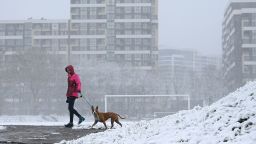Ten million Ukrainians are without power just as temperatures fall to freezing and below after more Russian missile attacks, President Volodymyr Zelensky said. CNN spoke to Kyiv residents and how they’re coping under these conditions.
Volodimyr Hontar,?32, is the head of the training department of the Emergency Medical Care Center in Kyiv.?Due to the nature of his work, ambulance stations are always independent of power outages and have electricity. However, it’s when he comes home that problems begin.
“I live on the 9th floor, it’s hard to go up without the elevator, which is turned off during power outages,” he says. “But with my wife, it’s romantic by candlelight in the evenings.”
But Hontar is most concerned about?soldiers at the front line. He says that if they’re alright, everyone will be alright.?
Olena Kravchuk, 35, is a utility worker who lives in Irpin and works in Kyiv.
(CNN)
Olena Kravchuk,?35,?is a utility worker who lives in Irpin and works in Kyiv. The blackouts aren’t affecting her job because she works outside, but at home, her kids have trouble logging into school online and miss classes.
“If there is no electricity and gas, there will be no heat, we are very worried about it,” Kravchuck says. “When you come home from work, there’s no light, you can’t call your children, there’s no cell phone or internet.”
Elena Khaykina, 63, and Larisa Polyakova, 66, are pensioners displaced from Kharkiv who have been living in Kyiv for the past three months.?
(
Elena Khaykina, 63,?and Larisa Polyakova, 66,?are pensioners displaced from Kharkiv who have been living in Kyiv for the past three months. Both women are very concerned about their loved ones who remain in Kharkiv.?
“My son in Kharkiv has no electricity 24 hours a day, it worries me a lot,”?Polyakova?says. The power cuts are not as intense in the capital.?
“We are from Kharkiv, and we are united here in Kyiv and try to support each other,” Khaykina says. The windows in her Kharkiv apartment are broken from shelling, and she cannot go back and survive winter there.
Bogdan, 30, is a food delivery man in Kyiv. Bogdan, who did not want to give his last name, says power outages affect his work because many cafes have to close, and there are less orders.
He also finds it difficult to charge his electric bike that he uses for deliveries. Heavier snow will make it more difficult to bike around the city.?
When there is no power at home, he listens to audiobooks downloaded on his phone.?
He worries about the soldiers in the trenches facing a harsh winter. And the rest, he says, “we will get through the rest.”
























